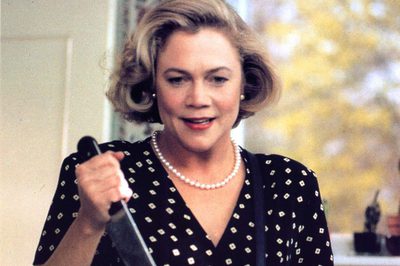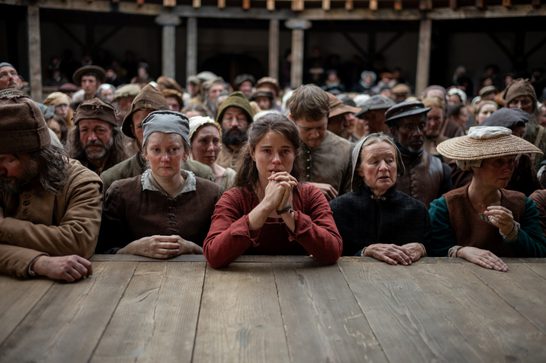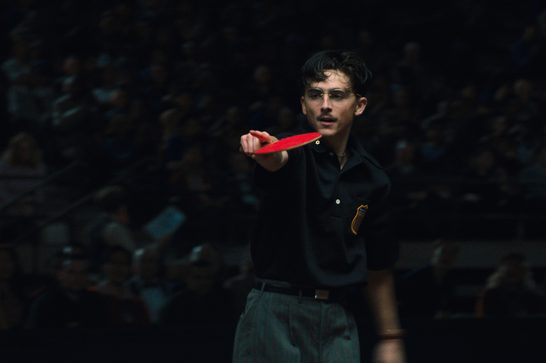News Story
Words: Dr Sabina Stent
In her July 2024 essay for CrimeReads, Julia Sirmons notes that “Serial Mom opens with title cards that mimic the typical true crime disclaimers: the film was based on interviews and witness testimony. And then,” she says, “there’s the kicker: “Some of the innocent characters’ names have been changed in the interest of a larger truth.” As Sirmons notes, the quotation marks work in two ways: to protect crime fiction from liability, and to make a case for its own cultural legitimacy. “Waters,” she continues, “mimicking this, makes his satire reveal larger truths about American values and obsessions.”
To say a filmmaker like John Waters relishes skewering various facets of human nature and family values—including obsessions with true crime and celebrity culture—would be an understatement, and we, his rapt audience, take perverse pleasure in his pride. This is perhaps why 1994’s Serial Mom, Waters’ satirical black comedy about a seemingly mild-mannered housewife with a murderous disposition, was the perfect vehicle for the provocateur affectionately dubbed the “Pope of Trash”, an auteur who takes every opportunity to expose the seedier and more perverted side of suburbia. Serial Mom is one of Waters’ best, yet it is seldom screened or broadcast; reviews were mixed at the time of release, and the film tanked at the box office (it grossed nearly $8 million). Yet Waters’ scathing comedic satire has since become a much-loved cult classic and favourite.

Serial Mom stars Kathleen Turner as Beverly Sutphin, alongside a supporting cast of Sam Waterston, Ricki Lake, and a pre-Scream Matthew Lillard as her on-screen family. The many cameos include heiress/fugitive Patty Hearst, the late actress and author Suzanne Somers—who appears as a fan hoping to portray her “feminist heroine” in a made-for-TV movie about Beverly’s life—alongside comedian/legend Joan Rivers, former porn star and actress Traci Lords, and Warhol Factory member Brigid Berlin. Both Lake and Lords are Waters darlings, having appeared in Cry Baby four years earlier.
On the surface Beverly is a polite and unassuming upper-middle-class housewife to her dentist husband and a doting mother to their teenage children, living in Towson, Maryland. (Waters likes to keep things loyal to his native Baltimore). However, as we know—whether via David Lynch’s Blue Velvet or the television series Desperate Housewives—you should never be fooled by the niceties of suburbia and a white picket fence. Behind the perky demeanour, pie baking, and pinafores, Beverly is a phone-pranking, gore-loving, cold-blooded serial killer with a simple code: if you annoy her, she will murder you—and she will murder in broad daylight, on the high school grounds, or in the men’s bathroom of the local mall— for “perceived crimes against polite society,” whether that is wearing white after Labor Day or failing to rewind a rented VHS tape.
Yet Beverly has no qualms in dirtying things closer to home, whether that be a neighbour who stole her parking space, a teacher criticising her son’s interest in horror films, or a love rat standing her daughter up for a date. Some might say she is a protective mother with her family’s interests at heart and no time for criticism of her children, qualities of a good and nurturing matriarch but executed (quite literally) in a manner that says otherwise. However, unlike most of the mothers in the MAC’s Bad Mums season, Beverly is the only one with serial killer paraphernalia under her mattress.
It is curious to think that Meryl Streep, Kathy Bates, Glenn Close, and even international treasure Julie Andrews had been considered for the role, but Turner is fantastic as Beverly, putting everything and then some into her portrayal. For the film’s inspiration, Waters’ drew on work by Doris Wishman, Otto Preminger, William Castle, and Herschell Gordon Lewis, and rather than conceal these influences, we see examples of their films playing on television sets at various points during Serial Mom. However, the audio we hear of Ted Bundy’s voice is not that of the jailed convicted murderer but the voice of Waters himself.
Having made his name in the early 1970s with transgressive cult films that riff on comedy and surrealism Waters has given us Multiple Maniacs (1970), Pink Flamingos (1972), Female Trouble (1974), Hairspray (1988) (which was later adapted into a hit Broadway musical and a 2007 musical film), as well as Polyester (1981), Cry-Baby (1990), Serial Mom (1994), Pecker (1998), and Cecil B. Demented (2000). Not one for subtlety, Waters never does things by half. Yet his work has such style and humour, and Serial Mom remains as riotous, fresh, and funny as it was thirty years ago. It’s impossible not to titter when Turner is pranking Waters’ long-time collaborator, Mink Stole, with the most over-the-top, preposterous insults, yielding—much like the rest of Serial Mom—some laugh out loud hilarious moments.
In her article, Sirmon noted the comparisons between the fictional Beverly and the factual Betty Broderick, a wealthy suburban mother who killed her ex-husband and his new wife after an acrimonious divorce in a murder case that gripped America’s fascination. “If Broderick,” Sirmon writes, “a picture-perfect Super Mom, could suddenly “snap” and become a killer, what were other seemingly-contended housewives capable of?”


